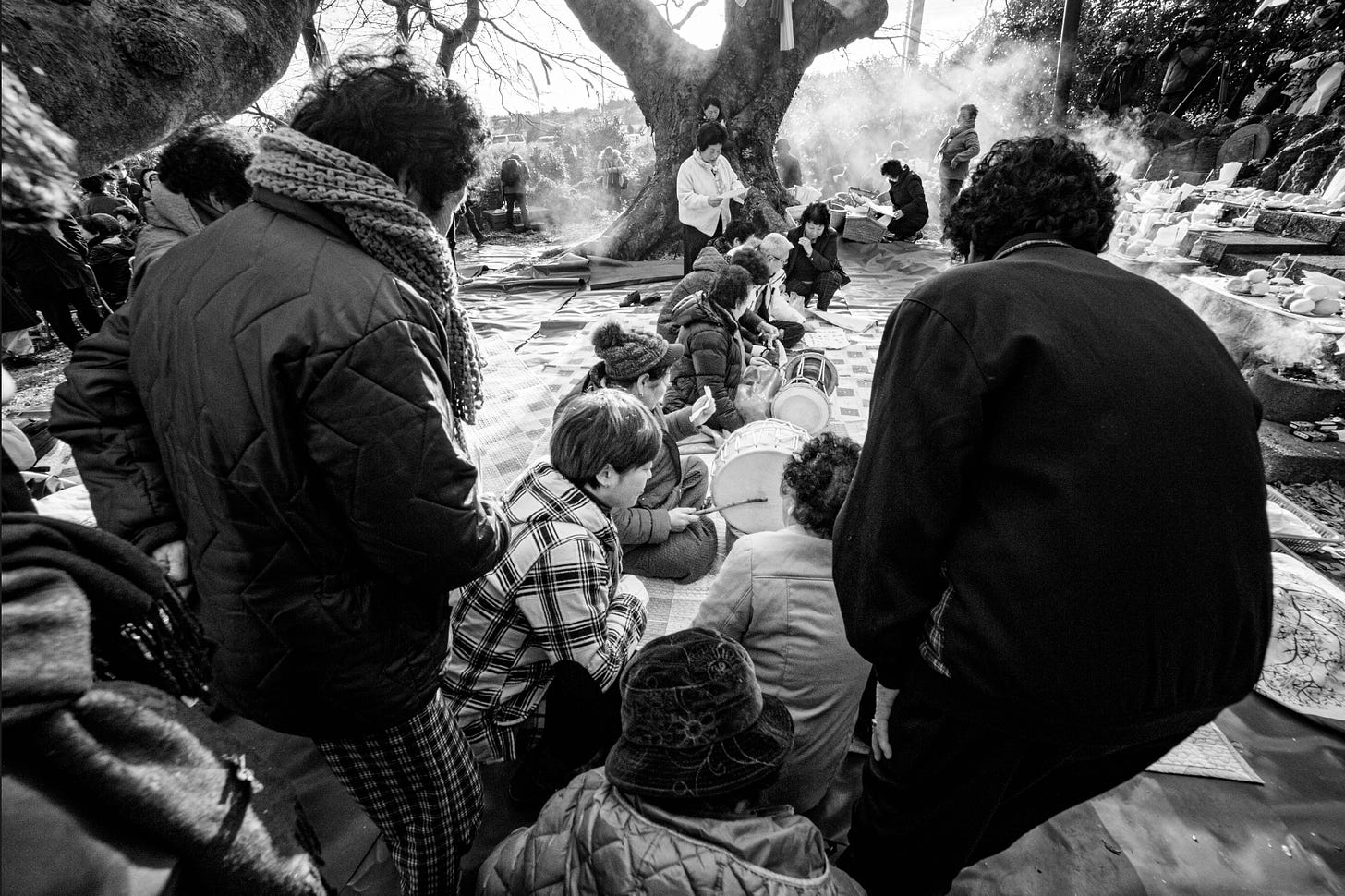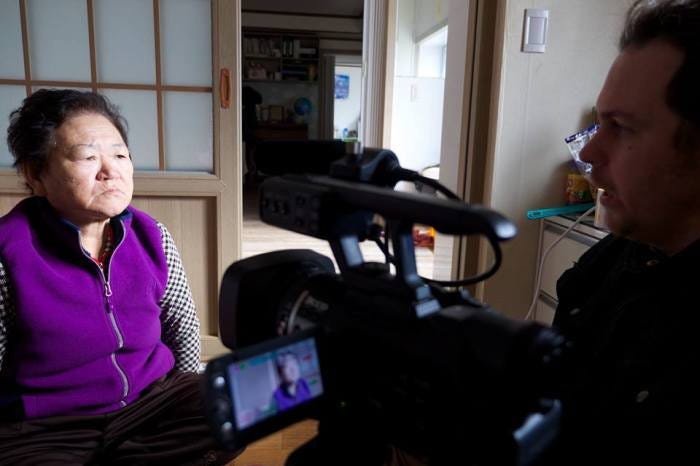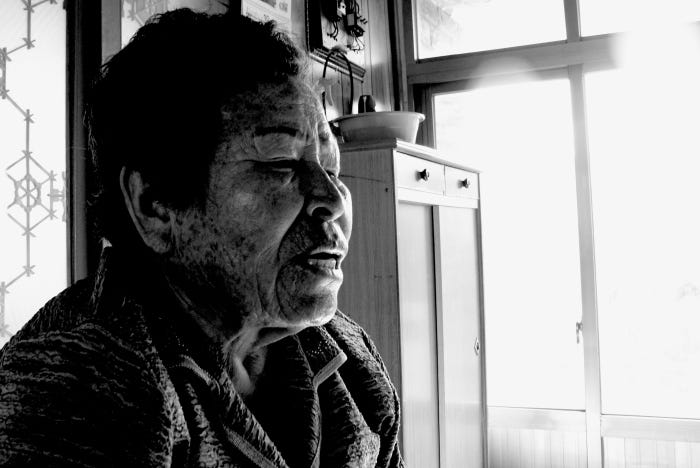Gameunjang-agi, Goddess of Fate
Jeju Island's Deities (Part One): Gameunjang-agi, Goddess of Fate
The first in a series of posts about Jeju's high pantheon. The dozen epic myths called Ilban Bonpuli tell how Jeju's different deities came to play their current roles in the island's cosmology. These epics are sung during rituals as well as portrayed during 'nolli/e', dramatic reenactments of mythic events that take place during shamanic rites.
Samgong Bonpuri: Gameunjang-agi, Goddess of Fate
The Samgong Bonpuri is Gameunjang-agi's story. She is Jeju Island's goddess of destiny, associated with the concept of jeonsang. We’ll return to jeonsang in a later post, but simply put, the word means fate or destiny. In local shamanic thought one's destiny is greatly influenced by ancestral karma. In the Samgong Bonpuri, the teenage (and angst-ridden) Gameunjang-agi displays a great deal of control over her own fate.
On Jeju Island, a person's fate is not written in stone. In fact, the nolli/e or play performed to tell Gameunjang-agi’s story is itself a rite to ensure prosperity or positive jeonsang for the audience.
The Samgong Bonpuri.1
Gameunjang-agi's parents to be live in two neighboring villages on Jeju Island. The goddess's mother hears that the harvest in the lower village has been successful while her father hears that the upper village's harvest has been successful. In reality, both villages are experiencing hard times. The goddess’s mother and father meet on the road to the other's village. The two of them marry, become rich and have three daughters. The two eldest daughters are seemingly model children, but they are really two-faced and treacherous.
One day, the father calls on each daughter. He asks his eldest daughter, "To whom do you owe your life and well-being?" "To the Sky God and the God of this World, of course. And to my mother and my father." The father is pleased with the eldest daughter’s answer. Next he calls his second daughter. "To whom do you owe your life and well-being?" "To the Sky God and the God of this World. And to my mother and my father," responds the second daughter. The father praises her and sends her away. Next he calls the youngest, Gameunjang-agi. "To whom do you owe your life and well-being?" he asks. "I owe my life," says Gameunjang-agi, "to the Sky God, the God of this World, my mother, my father. And,” she adds, “to that small line that runs below my belly button." At this indiscretion her father becomes furious. He banishes his youngest daughter from her own house.
Gameunjang-agi packs her things. As she loads her iconic black cow up with supplies, her mother feels regret for what has happened. She orders her eldest daughter to take Gameunjang-agi something warm to eat. Contrary to her mother's wishes, the eldest daughter runs out in front of the house, jumps atop a hitching post and shouts:
"Little sister, you must run! Mother and father are coming to beat you."
Gameunjang-agi realizes that her eldest sister is lying. She blasts an incantation at her. "When you come down from that hitching post you will turn into blue centipedes!" Her sister hops down and, indeed, turns into blue centipedes.
Inside the house, Gameunjang-agi’s mother worries. She sends out her second daughter with the same instructions. The second daughter tries to trick the clever Gameunjang-agi, "Run sister! Run! Mother and father are coming to beat you." The second sister has taken her place atop a compost bin.
"When you come down from that compost bin," blasts Gameunjang-agi, "you will turn into the type of mushrooms that grow on top of horse shit." When the second daughter hops down she is transformed into mushrooms.
Soon the victorious Gameunjang-agi departs. Her mother and father, alarmed that their daughters hadn’t returned, go out to find them. However, upon breaching the gate house's threshold the two are blinded. Due to their new circumstances the goddess’s parents fall into poverty. Eventually they become traveling beggars.
Gameunjang-agi, now far away from home, finds a family in whose house she can board. The family has three sons. The youngest son is both kind and considerate while the elder two are neglectful and abusive. Gameunjang-agi chooses the youngest son as her husband and the two live happily together.
After some time, something begins to gnaw at the goddess. What had happened to her poor parents? Following the custom of the day, being a woman of means, she holds banquets at which she provides meals for the beggars that circulate the countryside. She holds these banquets for some time, sacrificing rice or grain from her own storehouses. One day, the goddess finds her parents amongst the beggars and the three are reunited.
Gameunjang-agi is an independent spirit and it has been said that there are many Gameunjang-agis on Jeju Island still today.
The original bonpuri myths of Jeju Island are sung and/or chanted in poetic stanzas. The above is an outline of the plot of Kameungjangagi’s myth. For an outline of the myth as told by Sa In An, a famous Jeju Island shaman, see the Wikipedia article on the Samgong Bonpuli under the narrative heading.






